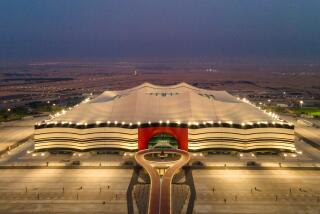Play ball, mate
- Share via
The Cricket World Cup is whipping up excitement in the West Indies.
Globalization may lessen exotic experiences around the planet, but an American could find inscrutable mystery right now in the Caribbean.
That’s because a handful of English-speaking nations deep in the Snorkel Belt speak a popular but eccentric lingo in which “over” is a noun and “wicket” has up to six definitions.
In other words, they’re talking cricket — and now more than ever.
For the first time, the Cricket World Cup plays out in the Caribbean, with the proof in the omnipresent mascot named Mello, an orange meerkat with a jaunty expression holding a cricket bat.
So if tourists have picked up local-speak while sipping drinks sprouting little umbrellas, it’s because they’ve landed amid the 47-day, eight-country event that started March 13 and builds toward a final match April 28.
It’s the biggest sporting event in the region’s history and likely the most-watched sporting event worldwide after soccer’s World Cup and the Summer Olympics. Cricket reigns in populous former British colonies such as India (1.1 billion people), Pakistan (165 million) and Bangladesh (147 million). And although it doesn’t dominate its soccer-mad birthplace, even Britain’s cricket naysayers often find a six-hour match hypnotic, with its nuances, cultural variations in playing style and party atmosphere. Cricket, a British concoction at least eight centuries old, has alighted in one of its natural homes, where the traditional accompaniment comes from bongos and trumpets.The Kensington Oval of Bridgetown, Barbados, the site of the April 28 final, first held a cricket match in 1882. The host team, which goes by the name West Indies, enthralled English fans in 1975 and 1979, winning the first two World Cups in London.
Some visitors planned their journeys early in the form of a cricket cruise, ensuring that Caribbean tourists might end up hanging out with Australians and Kiwis.
Now even the mildly curious might be able to purchase tickets, many of the locals having found them unaffordable. For anywhere from $25 to $100 — $90 for the “party stand” near the DJ and bar — a match will supply perhaps six or seven hours of cricket plus resilient music, a West Indies cricket staple, even if the 9:30 a.m. starts come as a jolt in the laid-back Caribbean. (Tickets for the final runs $100 to $300 per person. For tickets, go to cricketworldcup.indya.com.) But amid the revelry, this cricket World Cup gained note for a tragedy. After Pakistan’s improbable loss to Ireland on March 17, hotel housekeepers the next day found Bob Woolmer, Pakistan’s world-renowned coach, dead in Kingston, Jamaica. Police, having ruled the case a homicide, think their investigation may require months.With flags at half-staff, the cricket World Cup played on. Remaining match sites include the independent states of Grenada (settled by the French then seized by the British), Barbados (uninhabited until the British seized it), Jamaica (settled by the Spanish then seized by the British) and St. Lucia (whipsawed between the British and French 14 times before the British seized it).
In fact, India and Pakistan figured to form a singular cultural experience April 15, almost certainly playing each other and filling Bridgetown with Indians, Pakistanis and other cricket enthusiasts. Instead, the hotly anticipated match fizzled as neither India nor Pakistan — nor their uproarious rivalry — advanced beyond the original 16 countries into the Super Eight. While those two countries echoed with grumbles and vitriol, neighboring Bangladesh exulted.
So on April 15, the spirited young Bangladeshis, who had an outside shot to make it this far, will play the semiprofessional band of Irish, who had almost no chance to make it this far.
Other matches carry more gravitas. The Australians, World Cup winners in 1999 and 2003 and almost everybody’s guess to make it three, today will renew an intensive rivalry with England. With their Tasmanian star Ricky Ponting, the seventh cricketer ever to score 10,000 runs in a lifetime, they’ll also play overmatched Ireland on Friday, tough Sri Lanka on April 16, their capable neighbors New Zealand on April 20 and almost certainly a semifinal on April 24.
Thursday’s match will pit New Zealand against Sri Lanka, whose bowler Lasith Malinga became the first man to take four wickets in four balls in an international match. In cricket-ese, that definition of “wicket” entails a bowler (such as Malinga) dismissing a batsman (such as the South Africans that day).
On April 17, South Africa will play England. The former, No. 1 in the world rankings, includes Herschelle Gibbs, who became the first man to record six sixes in an over in a World Cup.
The first “six” in that passage means the number six, the second means any ball batted skyward and out of the playing surface over the fence, and the “over” means a set of six balls bowled in succession.
And on the last day before the field narrows to four, England will play the hosts, West Indies, on April 21.
That party could determine whether England star Andrew Flintoff will fulfill his promise to compensate for a rowdy night in St. Lucia when he wound up capsizing a pedal boat at 3 a.m.
Even without speaking cricket, every Caribbean tourist can decipher that story.
More to Read
Sign up for The Wild
We’ll help you find the best places to hike, bike and run, as well as the perfect silent spots for meditation and yoga.
You may occasionally receive promotional content from the Los Angeles Times.




